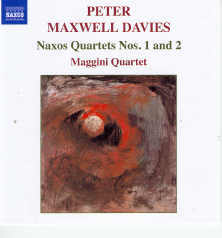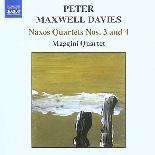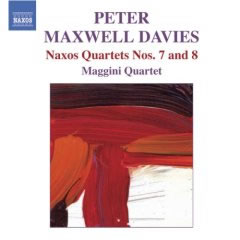 Maxwell Davies Quartets Maxwell Davies Quartets
The first Naxos String Quartet
Sir Peter Maxwell Davies: Quartet Movement (1980); two Little Quartets (1980 & 1987)
Naxos Quartet No 1 (2002)- premiere
Haydn: Quartet Op 71 No 1
The Maggini Quartet Wigmore Hall 23 October 2002
This was an important event for what was achieved and for what it promises. During the afternoon and evening Sir Peter Maxwell Davies shared his thoughts (fluently, without any notes), talking about his own direction as he nears 70 and the state of music in general (bleak; the BBC may have to disband its orchestras; cities may become too dangerous to hold large scale musical events - the string quartet will survive!).
He has relished an inspired collaboration with Naxos and embarked on a five year commission to devote himself to composing 10 string quartets, which he envisages as a unified work, the whole grand scheme already in his head, but the music to be 'generated from motives' as they take him, not 'poured into a bottle'. He is enthused by the project and teeming with ideas; two of the quartets might be playable simultaneously as in Milhaud's quartet cycle http://www.musicweb.uk.net/classrev/2002/Sept02/Milhaud_Quartets_Parisii.htm .
The earlier quartets were brief and pregnant with interest and promise, Tippett hovering around them. Haydn was a perfect foil for the première of Davies' First Naxos String Quartet, which began with a double exposition. In a pre-concert demonstration we were helped towards familiarisation with the sound world and some landmarks to guide us into the complex idiom and musical thinking. This is forward looking music where every note matters and tells - music with a sense of direction and a long term trajectory, with no reliance on extended techniques and far away from the worlds of improvisation and graphic scores. Was the slow movement, partly a passacaglia, but with violent eruptions; a little too long, my only reservation? Endings are inconclusive, suggesting beginnings. It finishes with a deliberately 'too short' movement, a brief skittering, wisps of tone disappearing into the stratosphere. Max likened it to the finale of Chopin's Bb minor sonata; he plans to 'bring it down to earth' again in a later quartet in the series.
This is a major work, not one to be absorbed at a single hearing, ideal to take into your home too. The 10 Naxos Quartets will all be entrusted to the Magginis and released year by year on CD, two by two. This programme, including the Haydn, was ideally balanced and would be just the right length for a CD.
Peter Grahame Woolf
Sir Peter Maxwell Davies 10 string quartets
Nos 4 & 5 at Wigmore Hall Maggini Quartet 20 October 2004
 Nos. 1 & 2 Naxos CD 8.557396 (73 mins; £4.99) Nos. 1 & 2 Naxos CD 8.557396 (73 mins; £4.99)
MaxOpus website
Naxos quartets 4 & 5 were being heard for the first time in London, the fifth receiving its world premiere. Again, the sound world is what many will find backward-looking, the avoidance of extended techniques reminding us, by contrast, what Webern was doing as long ago as 1909 in his pieces for string quartet!
Sir Peter might better have kept to himself his extra-musical triggers (lighthouses of Orkney and Shetland and children's games) which would not have entered listeners' minds uninvited? There were some Scotch snaps and cross rhythm conflicts in No 4, but otherwise it all sounded rather dour on first hearing; I engaged more fully with No 5 and was impressed with the conviction and refinement of the Magginis, who upstaged Davies with Haydn's Op 71/2; there are so many great Haydn quartets that one comes back to them again and again as if they were new.
Sir Max told us that he wanted the quartets to stand individually as well as comprising a single whole. Although these were shorter than the first two, the scheme looks to be coming out at some four hours total, and doubtless someone will eventually mount a complete performance.
Before that time comes, I do hope that someone else will mount a London performance of a quartet cycle I have recommended enthusiastically which, I am convinced, would make a great concert; the Canadian Murray Schafer's seven quartets - at 130 mins total, of a manageable length. I doubt that they were conceived as a cycle, but they grew into one.
Will collectors go the course and buy all five Maxwell Davies CDs, one a year? Nos 1 & 2 are now released by Naxos, and they are immaculately played and recorded, with explanations by the composer that are fine if you are blessed with perfect pitch and can follow all the harmonic progressions: " - a D minor cadence signals clearly the termination of the first subject - - the ultimate C minor chord functions clearly, I hope, as an F minor dominant" etc; this is not, I suspect, how most people listen to music? The balance should be tipped positively by Naxos's pricing; the whole lot for less than one concert at Wigmore Hall can cost you!
Maxwell Davies has suffered, as have so many composers, from deletions of his music by record companies, and the demise of Collins Classics. He now has, up and running successfully, a splendid personal website MaxOpus, with comprehensive information about all his music and the opportunity to download it (or to have CDs of selected works tailor-made and sent to you) at very reasonable prices.
Self publishing is taking off alongside internet purchasing, and should be watched by music lovers looking for something different. (I am planning shortly to make available, similarly and soon, music which I produced for LP, those long since deleted and unavailable.)

Maxwell Davies - Naxos Quartets Nos 3 and 4
Maggini Qartett
Naxos: 8557397
Peter Maxwell Davies composed his Naxos Quartet No. 3
" - - exploring the compositional potentialities of a magic square of Saturn (3 x 3) within one of Mars (5 x 5) within one of Venus (7 x 7). This would all be developed alongside an independent square of the Moon (9 x 9), with the associated isometric disciplines - - a concentrated attempt at virtuoso composition owed much to a restudy of Bach's two and three part keyboard inventions - - "
Ah!......... Fortunately J S Bach didn't burden us with describing his technical procedures, and Max's notes may be more daunting to the ordinary listener (or Orkney resident) than is the music itself.
I enjoyed the sound of this third quartet in the Naxos series; it is often beautiful and the performance and recording quality instil confidence. I am sure, for those who have the time, it will gain from rehearing and familiarity.
No 4 (Children's Games) disturbed me again, as when heard live. Max had aimed for "something lighter and much less fierce than its predecessor", but composition got mixed up with the Iraq war and it is a heavy affair, in one long movement, not playful at all. But no need to be put off at Naxos's price for a premium quality production.
Maxwell Davies - Naxos Quartets Nos 7 & 8 
Year by year these quartets continue to appear, reliably interpreted and performed, recorded to high standards and comprehensively documented.
Are they being collected and enjoyed? To me, they seem overloaded with intellectuality and unlikely to prove lovable with replaying and greater familiarity. Will they be taken up by other quartets, and abroad?
The Magginis clearly do all that can be done for them, and No 7 (a tribute to Boromini) is an appropriately large and solemn structure in seven movements with a dignity which makes it somehow more accessible than some of the others through its c.54 minutes duration, inevitably courting comparison with the late Beethovens?
No 8 is more compact and was dedicated to The Queen. Has she been able to listen through its 19 minutes??
It has recently been put to me that Naxos expects most of its artists to be satisfied with the kudos of their exposure without financial reward, and that some regard it as a bit infra dig to be associated with the firm. Can any reader collectors comment on that, or on Max's quartets, to enlighten me?
PGW
Listen to high quality sound samples at http://www.maxopus.com/discog/naxos3.htm
|



